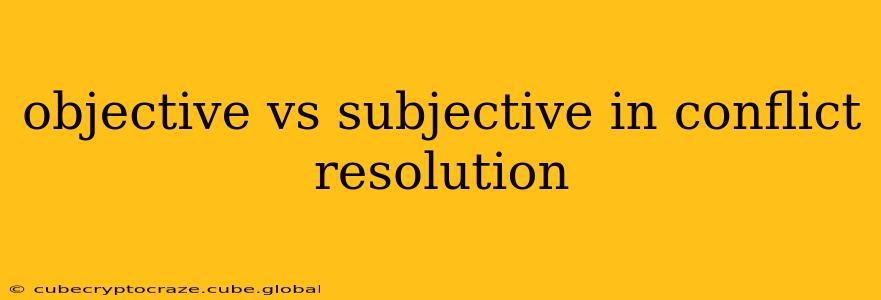Conflict is inevitable in any interaction, whether personal or professional. Successfully navigating these disagreements hinges on understanding the difference between objective and subjective perspectives and how to leverage both in conflict resolution. This article explores the nuances of objective and subjective viewpoints in conflict resolution, offering strategies for effective communication and problem-solving.
What is Objective Information in Conflict Resolution?
Objective information refers to facts, data, and verifiable evidence that are independent of personal opinions or biases. In conflict resolution, this means focusing on observable actions, documented events, and quantifiable data. For example, if a dispute arises over a missed deadline, objective information would include the original deadline date, the actual completion date, and any documented communication regarding potential delays. It avoids interpretations and focuses solely on verifiable details.
What is Subjective Information in Conflict Resolution?
Subjective information, conversely, reflects personal opinions, feelings, interpretations, and beliefs. It's influenced by individual experiences, perspectives, and emotional states. In the same deadline dispute, subjective information might include one party's feelings of frustration, the other party's perception of the workload, or their individual interpretations of the communication surrounding the delay. This type of information is crucial in understanding the emotional landscape of the conflict but shouldn't be mistaken for irrefutable evidence.
How to Use Objective and Subjective Information Effectively
Successfully resolving conflicts requires a delicate balance of both objective and subjective information. Ignoring either can lead to ineffective solutions. Here's how to leverage both:
1. Establish the Facts (Objective Approach):
Before addressing emotions, clearly define the objective facts of the situation. This sets a foundation for a rational discussion and prevents misunderstandings based on differing interpretations. Use neutral language, avoid accusations, and stick to verifiable data.
2. Acknowledge Emotions (Subjective Approach):
Recognize that emotions are a valid part of the conflict. Actively listen to each party's perspective, allowing them to express their feelings without judgment. Empathy and validation are crucial here. Using phrases like, "I understand you feel frustrated," can significantly de-escalate tension.
3. Find Common Ground:
Once both objective and subjective information are on the table, look for common ground. This might involve acknowledging shared goals, identifying areas of agreement on the facts, or recognizing the shared desire for a positive resolution.
4. Develop Solutions Based on Facts and Understanding:
Once common ground is identified, brainstorm solutions that address both the objective facts and the underlying subjective concerns. This ensures solutions are realistic and address the root causes of the conflict, rather than simply addressing surface-level symptoms.
How Does Bias Affect Objective and Subjective Information?
Bias can significantly distort both objective and subjective information. Cognitive biases can lead individuals to selectively focus on information that confirms their pre-existing beliefs, while ignoring contradictory evidence. This can make it difficult to reach a fair and equitable solution. Being aware of potential biases, both your own and others', is crucial for effective conflict resolution.
What is the Role of a Mediator in Balancing Objective and Subjective Information?
A skilled mediator plays a critical role in balancing objective and subjective information. They facilitate a structured process that encourages the expression of both facts and emotions, ensuring that all perspectives are heard and understood. The mediator helps to keep the discussion focused, manage emotional outbursts, and guide the parties towards a mutually agreeable solution.
How Can I Improve My Skills in Balancing Objective and Subjective Information in Conflict Resolution?
Improving your ability to balance objective and subjective information in conflict resolution involves active listening, empathy development, and self-reflection. Practice identifying your own biases, seek feedback from others, and consider conflict resolution training to develop these skills further.
By effectively integrating objective and subjective perspectives, you can navigate conflicts more efficiently, fostering stronger relationships and more constructive outcomes. Remember, conflict resolution is not about winning or losing, but about finding mutually acceptable solutions.
